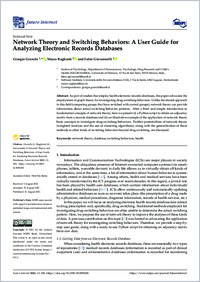Network theory and switching behaviors : a user guide for analyzing electronic records databases
- Gronchi, Giorgio Section of Psychology, Department of Neuroscience, Psychology, Drug Research and Child’s Health (NEUROFARBA), University of Florence, Firenze, Italy
- Raglianti, Marco Istituto del software (SI), Facoltà di scienze informatiche, Università della Svizzera italiana, Svizzera
- Giovannelli, Fabio Section of Psychology, Department of Neuroscience, Psychology, Drug Research and Child’s Health (NEUROFARBA), University of Florence, Firenze, Italy
-
31.08.2021
Published in:
- Future internet / Balke, Wolf-Tilo. - MDPI. - 2021, vol. 13, no. 9, p. 12
English
As part of studies that employ health electronic records databases, this paper advocates the employment of graph theory for investigating drug-switching behaviors. Unlike the shared approach in this field (comparing groups that have switched with control groups), network theory can provide information about actual switching behavior patterns. After a brief and simple introduction to fundamental concepts of network theory, here we present (i) a Python script to obtain an adjacency matrix from a records database and (ii) an illustrative example of the application of network theory basic concepts to investigate drug-switching behaviors. Further potentialities of network theory (weighted matrices and the use of clustering algorithms), along with the generalization of these methods to other kinds of switching behaviors beyond drug switching, are discussed.
- Language
-
- English
- Classification
- Computer science and technology
- License
- Open access status
- gold
- Identifiers
-
- RERO DOC 333709
- DOI 10.3390/fi13090228
- ARK ark:/12658/srd1319244
- Persistent URL
- https://n2t.net/ark:/12658/srd1319244
Statistics
Document views: 257
File downloads:
- Texte intégral: 245
